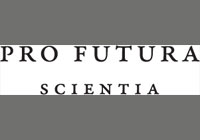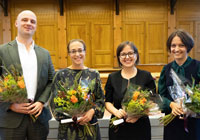

SCAS News - 30 September, 2022
Talented Early-career Scholars Welcomed to the Pro Futura Scientia Programme
Last week, a ceremony in honour of the four talented early-career scholars of the seventeenth
generation of Pro Futura Scientia Fellows was held at the Collegium.
In accordance with tradition, the newly admitted Fellows – this time David Karlander (FRIAS,
Albert-Ludwigs-Universität Freiburg, and University of Hong Kong. Nominated by Uppsala University);
Iva Lučić (Uppsala University. Nominated by Stockholm University); Sari Nauman (University of
Gothenburg); and Julia Velkova (Linköping University) – were presented with diplomas and flowers,
before briefly introducing the research projects that they will embark upon as Pro Futura Fellows. During
the second part of the ceremony, a visiting wind quintet from Uppsala University performed Maurice
Ravel’s Prélude and Menuet from Le Tombeau de Couperin, followed by a lecture by Professor Steven
Connor on the topic Thinking Big: Omnipotence and Academic Life.
It is always a delight to welcome a new generation of Pro Futura Fellows into the SCAS community
and into the distinguished group of young researchers who have been admitted to the Pro Futura
Scientia Programme since its foundation in 1999. This time was no exception.
Below you will find brief summaries of the research plans:
David Karlander (FRIAS, Albert-Ludwigs-Universität Freiburg, and School of English,
University of Hong Kong. Nominated by the Department of Scandinavian Languages, Uppsala
University)
Research project: Making Languages, Making Linguistics: Invented Languages as Topics and
Tools in Twentieth-Century Language Sciences
In the first decades of the twentieth century, several leading scholars of linguistics attempted to
create
invented languages – such as Anglic, Interlingua and Novial – or improve upon already existing
invented languages, such as Basic, Esperanto and Ido. In my Pro Futura Scientia project Making
Languages, Making Linguistics, I will deliver the first exhaustive account of this overlooked phase in
the history of linguistic thought. Exploring the connections, overlaps and exchanges between early
twentieth-century language sciences and invented language projects, I dispense with the long-dominant
idea that invented languages have had little or no impact on academic linguistics. By connecting singular
acts of language making to formative moments in early twentieth-century language sciences, I will, firstly,
be able to offer new insights into a crucial conjuncture in the history of linguistic thought. My focus on
invented languages as minor topics and tools of linguistic inquiry will, secondly, deepen our understanding
of the theorization of linguistic universality, diversity, agency and structure in twentieth-century language
sciences, as well as the relationship of such theories to visions of social change, unity and equality.
Examining the ambiguous status of invented language projects in twentieth-century language sciences,
I will, thirdly, disclose several durable tensions between the science and the politics of language. My
inclusion of invented languages in the disciplinary history of linguistics will, fourthly, serve to introduce
new perspectives on theories and debates of linguistic unity and diversity in twentieth-century language
sciences. These analytical angles will, fifthly, complicate biased views of language making and invented
language projects as marginal phenomena in the recent history of linguistic thought. In this vein, my project
will shed new light on the goals, limits and potentials of linguistic inquiry.
Iva Lučić (Department of Education, Uppsala University. Nominated by the Department of
History,
Stockholm University)
Research project: Extracting Nature. Making Peripheries. Global Perspectives on the Balkans as Extractive
Periphery, 1870-1990
The project examines peripheralization processes by means of natural resource extraction in the Balkans between
1870-1990, during a period marked by advancing extractive industries and major socio-economic and ecological transformations of the region. It breaks new ground in more than one sense. First, by exploring the hitherto
neglected Balkan region, it challenges mainstream theories on extractivism and center-periphery models as it
elaborates a novel methodological approach that studies political governance, ecology and social circumstances
from the interplay between bottom-up and top-down perspectives. Second, it uniquely explores the multiple
peripheralization processes of one region under a variety of shifting polities, including empires, post-imperial
nation-state formations, and communist regime. Third, it engages with cross-regional comparisons of the Balkans
with extraction peripheries in other parts of the world.
Sari Nauman (Department of Historical Studies, University of Gothenburg)
Research project: Outsiders Within: Internally Displaced Persons in Early Modern Europe
The project confronts the early modern legacy of European internally displaced persons (IDPs). It uncovers the
hidden history of these substantial groups who fled not from a state but within one. Ultimately, the project aims
to determine how authorities, communities, and IDPs negotiated belonging and the responsibility for protection
before nation-states and ideas of citizenship were in place. It contributes to a historical understanding of two major challenges for present-day societies: how to establish, localize, and distribute the responsibility to protect
displaced
persons, and how to guide interactions between authorities, local communities, and IDPs.
A case study of the Great Northern War acts as a stepping-stone for a broader, in-depth study of IDP reception
in European composite states. By tapping into an underused genre of sources—IDP petitions to local and central authorities—the investigation moves beyond sovereign decisions to the micro-practices of everyday encounters.
Julia Velkova (Department of Thematic Studies – Technology and Social Change, Linköping
University)
Research project: When Communication Networks Come to Die: Socio-Cultural Perspectives on Infrastructural
Dismantling
Large scale communication infrastructures, such as roads, railways, telephone, satellite, and fibre optic cable
networks have had a central role in shaping understandings of modern living, connectivity, and power. But as
analogue networks have switched to digital, and new digital communication infrastructures continue to be rolled
out, many ‘older’ networks have been pushed into a state of devaluation, irrelevance, dismantling or decay. These
processes are historically not new and can be traced back at least to the abandoned roads and aqueducts of the
Roman empire. Yet, their societal and cultural significance remains surprisingly neglected and undertheorized.
This project studies the politics, socio-material practices and lived experiences that arise when communication
networks are dismantled, with empirical focus on the ongoing decomissioning of the landline telephone networks
in Sweden and the UK. Opening a new direction in studies of media infrastructures, the project asks, how are
social relations sustained by and imbued in infrastructures being torn apart and reconfigured in dismantling? How
do these processes refigure understandings of citizenship and of the role of ‘old’ communication networks, in
everyday life?
----------
The Pro Futura Scientia Programme for early career scholars, set up in 1999 by the Swedish
Collegium for
Advanced Study (SCAS) and Riksbankens Jubileumsfond (RJ), aims at providing
optimal conditions for
promising scholars in the humanities and social sciences and to give them
the chance to pursue curiosity-
driven research. More than 60 scholars have been enrolled in the
programme since the start.
Read more: Pro Futura Scientia History and Mission
Read more: Nominations and Selections
Read more: Pro Futura Scientia Fellows (1999 - present)






